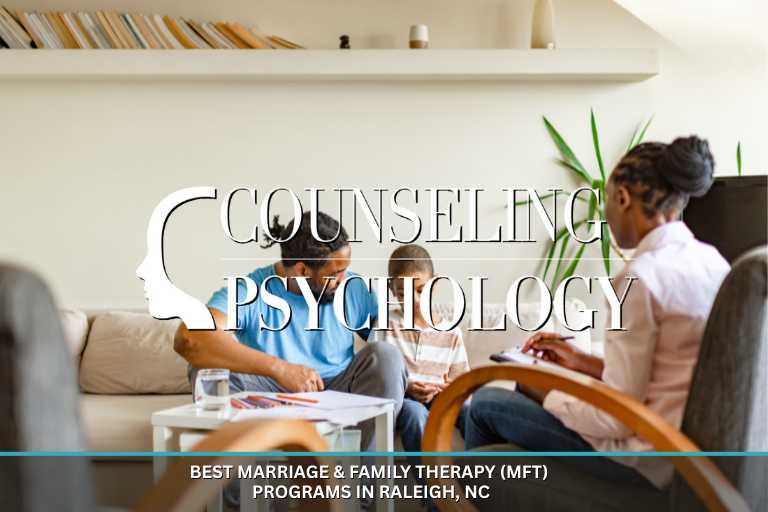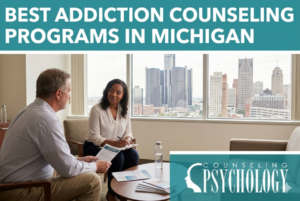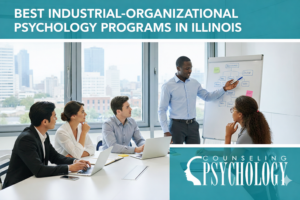Best Marriage & Family Therapy (MFT) Programs in Raleigh, NC

Raleigh, North Carolina, is not just a fast-growing tech and education hub—it's also a center for aspiring mental health professionals. As demand for licensed marriage and family therapists continues to rise nationwide, students are increasingly seeking high-quality MFT programs in cities that offer both academic excellence and clinical training opportunities. Raleigh delivers on both fronts, making it an attractive destination for future therapists.
According to the U.S. Bureau of Labor Statistics, employment for marriage and family therapists is projected to grow 15% through 2032—much faster than the average for all occupations. For students in Raleigh, this trend translates into a promising job outlook, a supportive professional community, and access to fieldwork in settings like hospitals, counseling centers, and private practices throughout the Research Triangle region. The city's emphasis on mental health access and collaborative health services further enhances training for future MFTs.
This article outlines the top MFT programs in Raleigh, highlights key curriculum details, and provides actionable guidance for aspiring therapists looking to build meaningful, licensable careers in North Carolina.
Top Accredited MFT Graduate Programs in Raleigh, NC in 2025
Why Choose Raleigh for MFT Education?
Raleigh is part of the Research Triangle, home to major universities, healthcare systems, and behavioral research institutions. This ecosystem provides MFT students with rich opportunities for clinical experience, professional networking, and post-graduate employment. Many programs also connect students to ongoing research projects, policy advocacy efforts, and multidisciplinary collaborations that enrich their educational journey.
Key advantages of studying MFT in Raleigh:
- Access to top-tier faculty
- Diverse practicum and internship settings within local clinics, nonprofits, and hospital systems
- Affordability and quality of life, with lower living costs than many other metro areas and a strong focus on community wellness
- Connection to professional organizations such as the North Carolina Association for Marriage and Family Therapy.
From urban clinics to suburban family practices, the city offers varied settings in which students can complete required field hours and build real-world experience. Raleigh's active clinical landscape allows students to tailor their fieldwork to special interests such as military family care, substance use recovery, or LGBTQIA+ family support.
Key Curriculum Components
Before applying to any program, it is critical to understand the academic and clinical expectations of MFT education. Programs in Raleigh typically offer coursework grounded in systemic approaches to family therapy, while also emphasizing ethical practice and clinical readiness. Students engage in role-plays, case consultations, and evidence-based interventions to develop therapeutic competence.
Common Curriculum Elements
- Core coursework: Family systems theory, human development, ethics, and assessment.
- Clinical hours: A minimum of 500 direct client hours, half of which must involve couples or families.
- Supervision: Weekly supervision by licensed MFTs, often using live or recorded sessions.
- Capstone projects or theses: Some programs require a final research project or comprehensive exam.
- Electives: Many programs offer electives in trauma-focused care, grief counseling, and group therapy.
Many Raleigh-area programs also include training in trauma-informed care, substance abuse counseling, and multicultural competence—critical skills for today's family therapists. Some institutions partner with nonprofit organizations or public health agencies to enhance student exposure to community-based approaches.
Practicum and Internship Opportunities in Raleigh
Supervised clinical experience is essential to becoming a licensed MFT. Raleigh and the surrounding region provide ample practicum and internship sites that support the application of classroom knowledge in real-world settings. Clinical directors and faculty advisors often help match students with placement sites that reflect their interests and long-term goals.
Example Practicum Sites in Raleigh
| Organization | Setting | Focus |
| Triangle Family Services | Nonprofit | Family safety, financial stability, mental health |
| Duke Psychiatry and Behavioral Sciences | Academic Medical Center | Advanced clinical supervision, integrated care |
| WakeMed Health & Hospitals | Hospital System | Inpatient and outpatient behavioral health |
| Local private practices | Community-based | Couples therapy, family systems work, trauma recovery |
| Haven House Services | Youth-focused nonprofit | Crisis intervention, family reunification |
These placements help students fulfill licensure requirements and transition more smoothly into employment after graduation. Many graduates continue working at their practicum sites or use those connections to network into private practice, school counseling, or integrated health teams.
MFT Licensure in North Carolina
Licensure ensures MFTs meet professional standards of competence and ethical practice. North Carolina outlines specific academic and clinical benchmarks that candidates must meet to become licensed. Understanding this process early can help students select programs aligned with licensure pathways.
Licensure Requirements
- Earn a master’s or doctoral degree from an accredited program.
- Accumulate at least 500 hours of supervised clinical experience during graduate studies.
- Complete two years of post-graduate supervised experience (1,500 hours).
- Pass the national MFT exam.
- Submit application materials to the North Carolina Marriage and Family Therapy Licensure Board.
Applicants must also complete ongoing continuing education to maintain their license, including hours focused on ethics and supervision.
Career Outlook for MFTs in Raleigh
Raleigh’s population has grown steadily in recent years, especially among young families and working professionals. As community needs evolve, so too does the demand for skilled marriage and family therapists. Graduates who remain in the region benefit from strong employer partnerships, interdisciplinary job openings, and community engagement opportunities.
Local Employment Trends
| Metric | Value |
| Median Annual Wage (BLS) | $58,510 |
| Projected Growth | 15% nationally through 2032 |
| Key Employers | Hospitals, school systems, group practices, telehealth platforms |
| High-Demand Areas | Child and adolescent therapy, couples counseling, crisis intervention |
Graduates from Raleigh-area MFT programs often secure positions locally, including in surrounding cities such as Durham, Chapel Hill, and Cary. Many choose to open private practices or contract with local health departments and family courts. Teletherapy has also become a significant avenue for employment, enabling more flexible and accessible care models.
Tips for Choosing the Right MFT Program
Selecting an MFT program is a significant step that influences academic experience, licensure readiness, and long-term career success. Below are essential criteria to guide this decision. Prospective students are encouraged to compare program cultures, funding options, and mentorship opportunities to find the best fit.
Program Evaluation Checklist
- Accreditation: COAMFTE accreditation streamlines licensure and ensures rigorous standards.
- Format: Determine whether on-campus, hybrid, or distance learning fits professional and personal commitments.
- Clinical Placement Support: Investigate how the program assists students in securing supervised fieldwork.
- Faculty Credentials: Look for instructors with clinical and research expertise in specific interest areas.
- Graduate Outcomes: Review data on job placement, licensure pass rates, and alumni networks.
- Support Services: Consider access to academic advising, peer mentorship, and licensure exam prep.
Campus visits, virtual tours, and informational interviews with faculty or alumni offer valuable context not captured in marketing materials. Program fit, learning environment, and long-term affordability should all factor into the decision-making process.
Launch a Meaningful MFT Career in Raleigh
Raleigh presents an ideal environment for those pursuing a marriage and family therapy career. The city blends academic rigor, clinical training infrastructure, and community need—making it a top choice for future therapists. With growing attention to mental health services at both local and state levels, Raleigh offers a supportive ecosystem for entering and advancing in the field.
With several accredited programs in reach, diverse practicum opportunities, and a strong employment outlook, Raleigh offers aspiring MFTs both the tools and the opportunities to succeed. Each step taken toward licensure and clinical competence helps build a healthier, more resilient community. Choosing to train in Raleigh places students at the intersection of innovation, compassion, and professional excellence.
Sources
- U.S. Bureau of Labor Statistics – Marriage and Family Therapists
- North Carolina MFT Licensure Board
- Triangle Family Services
- Duke Psychiatry and Behavioral Sciences
- WakeMed Health & Hospitals
- Haven House Services
- North Carolina Association for Marriage and Family Therapy



